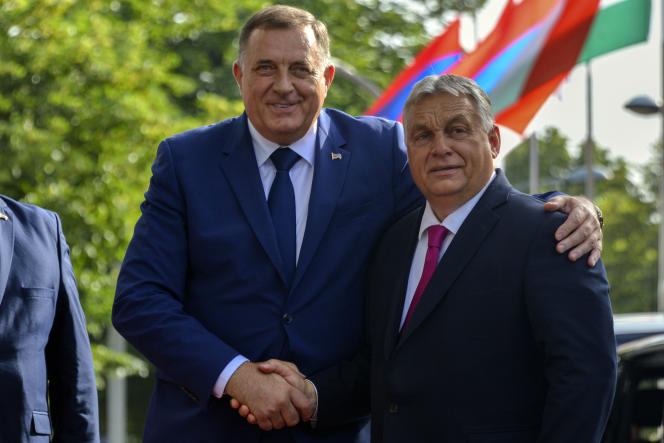Barely returned from one of his recurring visits to Budapest, on Monday August 21, the very nationalist president of the Bosnian Serb entity, Milorad Dodik, called a press conference in his “capital” of Banja Luka to announce the good news. On the sidelines of the opening of the world athletics championships, where he was invited by Viktor Orban, the Hungarian Prime Minister would have given him a nice gift by promising to invest 118 million euros to finance a wind farm in particular its territory in the Balkans, among the poorest on the European continent.
This Hungarian money will be used to “replace the Germans with whom we no longer want to cooperate” because they “are rude and incorrect”, boasted Mr. Dodik, criticizing Berlin for having recently suspended its development aid because of the recurrent separatist excesses of the Bosnian Serbs. Known for undermining any effort for unity in a Bosnia and Herzegovina undermined by ethnic divisions, ostracized by most Westerners for his radical nationalist positions, Mr. Dodik is thus reaping the benefits of his increasingly close proximity to Mr. Orban .
Since a first meeting in the summer of 2019, the two men, who have marked pro-Russian convictions in common, now see each other several times a year in Budapest or Bosnia, where they have become accustomed to multiplying signs of friendship. and jeer together ” Brussels “. Each time, the Hungarian promises to do everything to support the Bosnian Serb, whom he describes as “key to stability in the Balkans”by blocking, for example, any attempt to sanction the European Union (EU) against a man already sanctioned in the United States and the United Kingdom for his secessionist desires.
Hungary’s Peacock Dance
In the image of this friendship, Viktor Orban has shown in recent years a growing interest in the Balkans, a border region where six countries (Serbia, Bosnia-Herzegovina, Kosovo, North Macedonia, Albania, Montenegro) are candidates for entry in the EU. ” Viktor Orban is sending more and more money to the region”, observes Srdjan Cvijic, co-author of a study on what he calls “peacock dance” of Hungary in the Balkans. Published in May by the Belgrade Center for Security Policy, a think tank based in the Serbian capital, it identifies the increasingly visible divergences between Hungarian positions and those of the rest of the EU, as well as the interests economic growth of several large Hungarian companies on the spot, such as the OTP bank or the telecommunications operator 4iG.
You have 48.71% of this article left to read. The following is for subscribers only.
